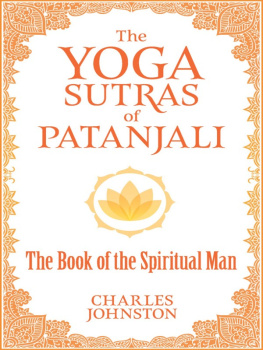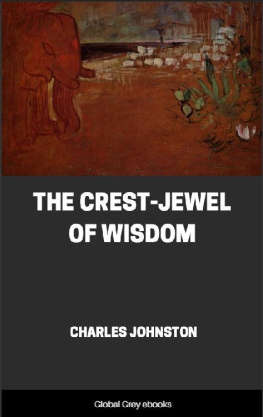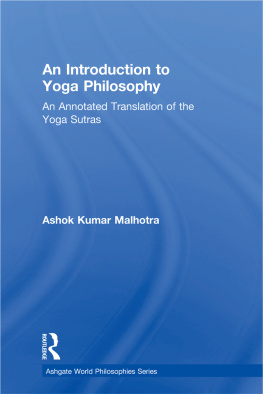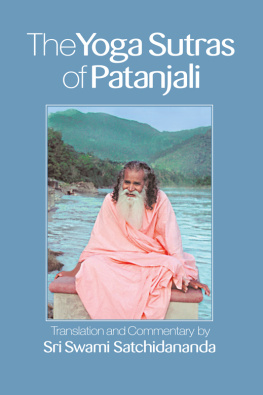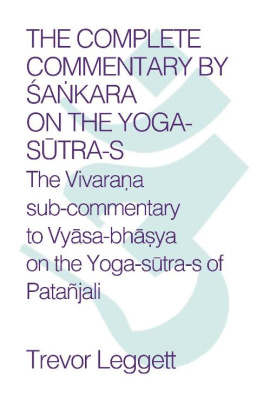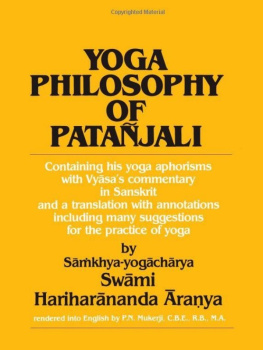
Bibliographical Note
This Ixia Press edition, first published in 2019, is a republication of a standard edition of the work, originally published as serialized articles in the Theosophical Quarterly between 1909 and 1911. It was first published in book form in 1912.
Library of Congress Cataloging-in-Publication Data
Names: Patanjali. | Johnston, Charles, 18671931, translator.
Title: The yoga sutras of Patanjali : the book of the spiritual man / Charles Johnston.
Other titles: Yogasutra. English
Description: Mineola : Dover Publications, Inc., 2019. | Series: Ixia press | Summary: This ancient text represents one of yogas most influential and important works. Dating back to India of the second century B.C., the yoga sutras constitute a complete manual for the study and practice of the philosophical system. The sutras, or threads, are aphorisms of wisdom that offer guidelines to living a meaningful and purposeful life. This volume explains the eight limbs of the discipline: restraint, observances, posture, breath control, withdrawal from the senses, attention, meditation, and stillness. Little is known about the life of Patanjali beyond the assumption that he was a contemporary of the Buddha. Charles Johnston, an immensely learned scholar of Eastern traditions, offers modern readers a straightforward translation of Patanjalis writings. This easy-to-follow interpretation will prove a rewarding companion to yoga students, participants in teacher-training programs, and students of Eastern philosophyProvided by publisher.
Identifiers: LCCN 2019031056 | ISBN 9780486836799 (paperback)
Subjects: LCSH: YogaEarly works to 1800. | Patanjali. Yogasutra. | YogaStudy and teaching.
Classification: LCC B132.Y6 P24313 2019 | DDC 181/.452dc23
LC record available at https://lccn.loc.gov/2019031056
Ixia Press
An imprint of Dover Publications, Inc.
Manufactured in the United States by LSC Communications
83679701
www.doverpublications.com/ixiapress
2 4 6 8 10 9 7 5 3 1
2019
Contents


Introduction to Book One

The Yoga Sutras of Patanjali are in themselves exceedingly brief, less than ten pages of large type in the original. Yet they contain the essence of practical wisdom, set forth in admirable order and detail. The theme, if the present interpreter be right, is the great regeneration, the birth of the spiritual from the psychical man: the same theme which Paul so wisely and eloquently set forth in writing to his disciples in Corinth, the theme of all mystics in all lands.
We think of ourselves as living a purely physical life, in these material bodies of ours. In reality, we have gone far indeed from pure physical life; for ages, our life has been psychical, we have been centred and immersed in the psychic nature. Some of the schools of India say that the psychic nature is, as it were, a looking-glass, wherein are mirrored the things seen by the physical eyes, and heard by the physical ears. But this is a magic mirror; the images remain, and take a certain life of their own. Thus within the psychic realm of our life there grows up an imaged world wherein we dwell; a world of the images of things seen and heard, and therefore a world of memories; a world also of hopes and desires, of fears and regrets. Mental life grows up among these images, built on a measuring and comparing, on the massing of images together into general ideas; on the abstraction of new notions and images from these; till a new world is built up within, full of desires and hates, ambition, envy, longing, speculation, curiosity, self-will, self-interest.
The teaching of the East is, that all these are true powers overlaid by false desires; that though in manifestation psychical, they are in essence spiritual; that the psychical man is the veil and prophecy of the spiritual man.
The purpose of life, therefore, is the realizing of that prophecy; the unveiling of the immortal man; the birth of the spiritual from the psychical, whereby we enter our divine inheritance and come to inhabit Eternity. This is, indeed, salvation, the purpose of all true religion, in all times.
Patanjali has in mind the spiritual man, to be born from the psychical. His purpose is, to set in order the practical means for the unveiling and regeneration, and to indicate the fruit, the glory and the power, of that new birth.
Through the Sutras of the first book, Patanjali is concerned with the first great problem, the emergence of the spiritual man from the veils and meshes of the psychic nature, the moods and vestures of the mental and emotional man. Later will come the consideration of the nature and powers of the spiritual man, once he stands clear of the psychic veils and trammels, and a view of the realms in which these new spiritual powers are to be revealed.
At this point may come a word of explanation. I have been asked why I use the word Sutras, for these rules of Patanjalis system, when the word Aphorism has been connected with them in our minds for a generation. The reason is this: the name Aphorism suggests, to me at least, a pithy sentence of very general application; a piece of proverbial wisdom that may be quoted in a good many sets of circumstance, and which will almost bear on its face the evidence of its truth. But with a Sutra the case is different. It comes from the same root as the word sew, and means, indeed, a thread, suggesting, therefore, a close-knit, consecutive chain of argument. Not only has each Sutra a definite place in the system, but further, taken out of this place, it will be almost meaningless, and will by no means be self-evident. So I have thought best to adhere to the original word. The Sutras of Patanjali are as closely knit together, as dependent on each other, as the propositions of Euclid, and can no more be taken out of their proper setting.
In the second part of the first book, the problem of the emergence of the spiritual man is further dealt with. We are led to consideration of the barriers to his emergence, of the overcoming of the barriers, and of certain steps and stages in the ascent from the ordinary consciousness of practical life, to the finer, deeper, radiant consciousness of the spiritual man.
Book One

OM: Here follows Instruction in Union
Union, here as always in the Scriptures of India, means union of the individual soul with the Oversoul; of the personal consciousness with the Divine Consciousness, whereby the mortal becomes immortal, and enters the Eternal. Therefore, salvation is, first, freedom from sin and the sorrow which comes from sin, and then a divine and eternal well-being, wherein the soul partakes of the being, the wisdom and glory of God.
Union, spiritual consciousness, is gained through control of the versatile psychic nature
The goal is the full consciousness of the spiritual man, illumined by the Divine Light. Nothing except the obdurate resistance of the psychic nature keeps us back from the goal. The psychical powers are spiritual powers run wild, perverted, drawn from their proper channel. Therefore our first task is, to regain control of this perverted nature, to chasten, purify and restore the misplaced powers.
Next page
